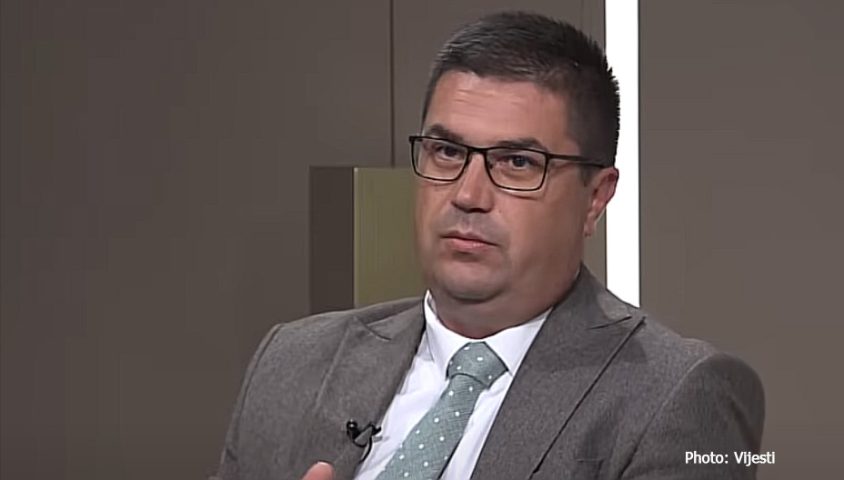
N12.T2 – Minister of Justice Announces Consideration of UN Rapporteur’s Recommendations in Upcoming Legal Reforms
08/10/2025
N12.T4 – Vesna Medenica Prohibited from Leaving Home Due to Court Absences, U.S. Places Her on Blacklist
08/10/2025N12.T3 – New Political Attacks on Constitutional Court Decisions Without Legal Grounds

HRA NEWSLETTER 12 – TOPIC 3
Politicians have continued the old practice of criticizing court decisions on remand in a non-argumentative manner. This time, the criticism came from Nikola Rovčanin, a member of the Democratic Montenegro party, who, as a guest on the TV Vijesti show “Nedjelja u retrovizoru”, commented on the decisions of Constitutional Court judges regarding the remand of Miloš Medenica and other defendants in high-profile cases.
“We have a Constitutional Court decision from April 23, 2024, in which the constitutional complaint in the case of Miloš Medenica was upheld, and his remand was revoked. The U.S. State Department imposes sanctions against Medenica, and the Constitutional Court releases from remand… The Special Prosecutor’s Office files indictments, and the Constitutional Court releases from remand. The same situation applies to Lazović. The same situation would have applied to Milivoje Katnić if Judge Đuranović had not been dismissed,” Rovčanin said.
In the case of Miloš Medenica, the Constitutional Court found on two occasions that the regular courts had failed to provide sufficiently clear and individualized reasons for extending remand, which was required under the Constitution, the law, and international human rights conventions.
According to the decisions, instead of assessing the specific circumstances, the regular courts relied on previous rulings, the potential sentence, frequent travel, and the defendant’s prior unavailability. The Constitutional Court found that the courts had ignored Medenica’s family and business ties in Montenegro, his voluntary cooperation with the authorities, and medical records regarding his treatment. The courts did not consider the possibility of applying less severe measures, nor did they assess that the risk of flight decreases over time, which is a standard in the case law of the European Court of Human Rights. On this basis, the Constitutional Court concluded that the right to liberty under Article 30, paragraph 4 of the Constitution and Article 5, paragraph 3 of the European Convention had been violated.
Similar deficiencies were found in the case of National Security Agency official Petar Lazović, with the Court ruling that the Higher and Appellate Courts had arbitrarily extended his remand without providing sufficiently clear and relevant reasons for the risk of flight. The Court emphasized that the potential sentence, the fact that other individuals are in hiding, or that a relative lives abroad are not, by themselves, sufficient reasons to extend remand, and that the risk of flight diminishes over time. It was noted that Lazović had not left Montenegro for years, responded to all prosecutor requests, and, although aware that he would be arrested, did not flee.
Despite these Constitutional Court rulings, both Medenica and Lazović remain on remand, which further indicates that politicians, even without necessity, often criticize court decisions lightly and without expertise.
Even individuals without legal education should understand that remand is not a punishment, but an extreme measure to ensure presence in criminal proceedings, and it must not be equated with a sentence, in accordance with the Constitution, laws, and international standards. In these cases, the Constitutional Court found a violation of the right to liberty, noting that the decisions to extend remand were not sufficiently clear or reasoned—a long-standing deficiency in judicial practice. Ignoring these findings undermines both the rule of law and public trust in the courts.
Rovčanin also made a dangerous claim that the outcome in the Milivoje Katnić case would have been the same if Judge Đuranović had not been dismissed. By doing so, he not only exerted unacceptable pressure on the court but also cast doubt on the ruling majority’s motivation for dismissing Judge Đuranović.
HRA NEWSLETTER 12
- N12.T1 – Constitutional Court at risk of blockade, authorities did not allow the election of Mirjana Vučinić as Constitutional Court judge
- N12.T2 – Minister of Justice Announces Consideration of UN Rapporteur’s Recommendations in Upcoming Legal Reforms
- N12.T3 – New Political Attacks on Constitutional Court Decisions Without Legal Grounds
- N12.T4 – Vesna Medenica Prohibited from Leaving Home Due to Court Absences, U.S. Places Her on Blacklist
- N12.T5 – Dragan Kovačević Acquitted by High Court – Judge’s Formulation Raises Concerns
- N12.T6 – Accountability of Saša Čađenović Under Review Over Statute of Limitations in ‘Telekom’ Case, Other Prosecutors Overlooked
- N12.T7 – Residents of Bijelo Polje Protest Over Delays at Administrative Court
- N12.T8 – Pre-Trial Detainees on Strike; Supreme Court President Calls for Amendments to the Criminal Procedure Code
- N12.T9 – Montenegro Loses Cases at the European Court of Human Rights; Government Issues Recommendations to Prevent New Applications
- N12.T10 – Four Convicted to 30 Years in Prison for the Murder of Inspector Slavoljub Šćekić
- N12.T11 – Prosecutorial Council Appeals to Parliament to Elect New Members; Special Prosecutor’s Office Strengthened
- N12.BN – BRIEF NEWS







 English
English